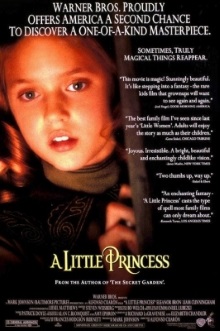
We’ve watched a fair few of director Alfonson Cuarón, most obviously Gravity and Children of Men. We’ve even watched his Mexican work, such as Y Tu Mamá También. I don’t believe I’ve ever disliked one of his films. This one is the very first film that he made in the US and was a box office failure. For this reason, I expect that very few people have actually watched it.
Sara Crewe is the young daughter of a wealthy Englishman, Captain Crewe, and grew up in India. As her mother died long ago, Sara is left alone when her father takes part in the World War I and she is sent to stay at a posh boarding school in America. The headmistress Miss Minchin is predictably hard-hearted and a stickler for the rules but Sara wins over most of the children with her knack for storytelling and her kindness. Her charmed life comes to an end when her father is reported killed in action and the payments to the school stop. Miss Minchen declares that she will allow Sara to stay on out of charity but as a servant and not a student. In the meantime, the elderly neighbor who lives next to the school has a mysterious Indian servant with a pet monkey. Clad in bright finery and wearing a grand turban, he seems to have magical powers and to know more than he lets on.
This is a straight up children’s film, predictably so in almost all respects with the main twist being that it calls upon the exoticism of India to provide a dose of magic. As such it’s trite and even somewhat condescending but it wins me over just the same due to the excellence of its visuals and the charm and enthusiasm of the actress Liesel Matthews who plays Sara. The sequences which depict the scenes from the Ramayana as recounted by Sara look awesome, especially after we recognizing the stories from watching Sita Sings the Blues. Cuarón’s flair for the theatrical and the dramatic makes this very pleasant entertainment indeed.
Well made as it is, I have to admit that this also looks like a very politically incorrect film when seen through modern eyes. It tries to do the decent thing by depicting the servant girl as black and thereby portray Sara in a favorable light in being friendly to her, but it’s still a film about a white girl born of extraordinary privilege. The character of Ram Dass is of course an example of the magical negro trope even if it uses an Indian. It’s amusing that the actress Matthews is herself pretty close to a real life princess, being an heiress of the family that owns the Hyatt Hotels group. I believe that this cinematic adaptation of the novel by Frances Hodgson Burnett even pulls the punches somewhat by highlighting the sense of magic and wonder and downplaying Sara’s hardships, the better to frame it as a children’s tale.
Naturally not everything that we watch needs to be serious drama and there’s nothing wrong with enjoying some entertainment. A Little Princess is solid entertainment but we must be cautious about drawing any lessons from it. In addition, we now understand why Cuarón was picked to direct Prisoner of Azkaban, by most accounts the best of all of the Harry Potter film adaptations.